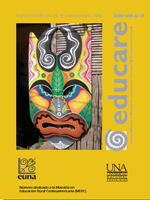La participación y su viabilidad en Costa Rica
DOI:
https://doi.org/10.15359/ree.12-Ext.7Keywords:
community participation, rural issues, legislationAbstract
This article is intended to discuss about existent national legislation concerning community and student participation.
It is focused on rural communities because of their serious limitations as well as their great potential for development.
An education for effective participation of the rural citizens is necessary since their first learning processes, in order to achieve their full and effective insertion inside the national and global market.
References
Bruner, J. (1986). Realidad mental y mundos posibles. Barcelona: Ed. Gedisa.
Costa Rica. Ministerio de Educación Pública. Decreto Nº 30329. (2002). Reglamento de la comunidad
estudiantil. San José: Autor.
Costa Rica. Ministerio de la Presidencia. (1998). Reglamento a la Ley Nº 3859 sobre desarrollo de
la comunidad. San José: Autor.
Costa Rica. Patronato Nacional de la Infancia [PANI]. (1989). Convención sobre los derechos del
niño. Resolución 44/25. San José: Autor.
Durston, J. (2002). El capital social campesino en la gestión del desarrollo rural. Santigo, Chile:
CEPAL, Naciones Unidas.
Fondo de las Naciones Unidas para la Infancia [UNICEF]. (2002/2006). Un mundo apropiado para
los niños y las niñas (Iera Reimpresión). New York: Autor. Freire, P. (1994, Julio). Nuevas perspectivas
críticas en educación. Ponencia presentada en el Congreso Internacional de “Nuevas
perspectivas críticas en educación”, organizado por la División de Ciencias de la Educación,
de la Universidad de Barcelona, España.
Gil, L. ( 2007). Políticas públicas para el desarrollo rural: La educación como eje del desarrollo
local, el caso de Nicaragua. Managua: IDEUCA.
Santos, M. A. (2000). La escuela que aprende. Retos, dificultades y esperanzas. Madrid: Ed.
Morata.
van der Bijl, B. (2000). Adecuación al contexto rural. División de Educación Rural, Universidad
Nacional.
Downloads
Published
How to Cite
Issue
Section
License
1. In case the submitted paper is accepted for publication, the author(s) FREELY, COSTLESS, EXCLUSIVELY AND FOR AN INDEFINITE TERM transfer copyrights and patrimonial rights to Universidad Nacional (UNA, Costa Rica). For more details check the Originality Statement and Copyright Transfer Agreement
2. REUTILIZATION RIGHTS: UNA authorizes authors to use, for any purpose (among them selfarchiving or autoarchiving) and to publish in the Internet in any electronic site, the paper´'s final version, both approved and published (post print), as long as it is done with a non commercial purpose, does not generate derivates without previous consentment and recognizes both publisher's name and authorship.
3. The submission and possible publication of the paper in the Educare Electronic Journal is ruled by the Journal’s editorial policies, the institutional rules of Universidad Nacional and the laws of the Republic of Costa Rica. Additionally, any possible difference of opinion or future dispute shall be settled in accordance with the mechanisms of Alternative Dispute Resolution and the Costa Rican Jurisdiction.
4. In all cases, it is understood that the opinions issued are those of the authors and do not necessarily reflect the position and opinion of Educare, CIDE or Universidad Nacional, Costa Rica. It is also understood that, in the exercise of academic freedom, the authors have carried out a rogorous scientific-academic process of research, reflection and argumentation thar lays within the thematic scope of interest of the Journal.
5. The papers published by Educare Electronic Journal use a Creative Commons License:















 The articles published by Educare Electronic Journal can be shared with a Creative Commons License:
The articles published by Educare Electronic Journal can be shared with a Creative Commons License: 



